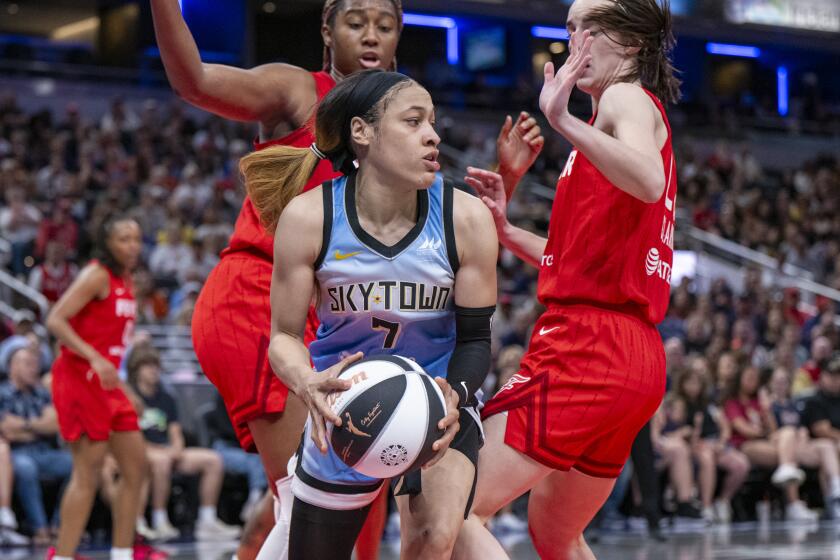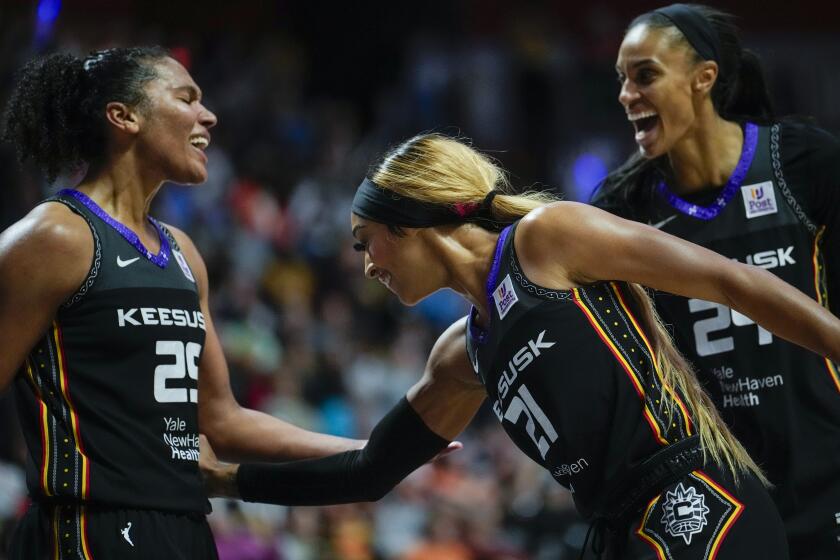
- Share via
A Texas man has been charged in Indiana with felony stalking after he allegedly sent Indiana Fever star Caitlin Clark a barrage of text messages that she told prosecutors left her “very fearful” and forced her to become wary of going out in public.
Michael Thomas Lewis, 55, appeared Tuesday in Marion County Superior Court in Indianapolis and — speaking out of turn — said to Judge Angela Davis, “guilty as charged,” according to ESPN. He continued to interrupt the proceedings until Davis repeatedly told him to “stop talking.”
Davis said she wouldn’t accept a guilty plea at an initial hearing, assigned a public defender to represent Lewis and entered a plea of not guilty on his behalf. Lewis was held on $50,000 bail and Davis ordered him to stay away from Gainbridge and Hinkle fieldhouses — venues where Clark and the Fever play home games — and not to have any contact with the 22-year-old Clark.
The stalking charge carries a prison sentence of one to six years and a fine of up to $10,000. Lewis is scheduled to return to court March 31 for a pretrial hearing.
Lewis was arrested Sunday after Indianapolis police unearthed messages from an IP address that placed him at a hotel and a public library near Gainbridge Fieldhouse, according to Marion County prosecutors.
A rookie in 2024 after setting multiple NCAA scoring records at Iowa, Clark quickly became the most popular woman player, drawing record crowds to Fever games, setting a WNBA record for assists in a season and making millions in endorsements.
Caitlin Clark, who made $76,535 as a rookie, was responsible for 26.5% of WNBA revenue, according to Ryan Brewer, an associate professor of finance at Indiana University Columbus.
But as what experts say frequently becomes the case, immense popularity can also bring unwanted attention. According to charging documents released Monday by prosecutors, Lewis allegedly sent a series of threatening and sexually explicit messages to Clark beginning Dec. 16 through Jan. 11 and traveled from Denton, Texas, to Indiana to be closer to her.
The court documents described the messages as “sexually violent” and said that they had “actually caused Caitlin Clark to feel terrorized, frightened, intimidated or threatened.” Clark took the messages seriously enough that she “altered her public appearances and patterns of movement due to fear for her safety,” according to the court filing.
Indianapolis police first spoke to Lewis last week, when his alleged threatening messages to Clark on the social media platform X were reported. Police traced Lewis to the hotel and he downplayed the messages, saying he was in an “imaginary relationship” with Clark and was visiting Indianapolis on vacation.
“It’s an imagination, fantasy type thing and it’s a joke, and it’s nothing to do with threatening,” he told police, according to an affidavit written by Sgt. Darren Stonehouse. Police told Thomas to stay away from the arena and to stop sending messages to Clark, but he sent her another that said, “Got banned from [the arena]. Im sorry. Bu maybe I go to ur road games..its ok right?”
However, Clark told a Marion County sheriff’s officer that she was “very fearful” since becoming aware of the social media posts, prompting the arrest of Lewis. She said that she did not know Lewis and had never responded to his messages.
Chicago Sky players including Chennedy Carter, who was called for a hard foul on Caitlin Clark last week, were allegedly harassed by man in D.C.
According to the court filing, one message from Lewis to Clark read: “Been driving around your house 3x a day. But don’t call the law just yet.” Other messages contained elements of sexual violence, according to the documents.
Harassing and abusive messages are on the rise, according to a study released by the NCAA in October. Analysts from the Signify Group reviewed more than 72,000 messages that targeted the social media profiles of athletes, coaches and officials. More than 5,000 posts containing abusive, discriminatory or threatening content.
Findings included that 18% of the abuse was sexual, making it the most prevalent type used to target male and female athletes. Additionally, 12% of the abuse was related to sports betting, 10% consisted of racist content, 9% was homophobic and 6% was violent. Women’s basketball players received approximately three times more threats than men’s basketball players.
Meanwhile, a report from the Aspen Institute’s National State of Play 2024 also published in October established that Clark’s popularity prompted an increase in young women playing sports. According to Ryan Brewer, associate professor of finance at Indiana University Columbus, Clark was responsible for 26.5% of WNBA economic activity for the 2024 season, including attendance, merchandise sales and television. One of every six tickets sold at a WNBA arena can be attributed to Clark.
“No matter how prominent a figure you are, this case shows that online harassment can quickly escalate to actual threats of physical violence,” Marion County Prosecutor Ryan Mears said in a statement. “It takes a lot of courage for women to come forward in these cases, which is why many don’t. In doing so, the victim is setting an example for all women who deserve to live and work in Indy without the threat of sexual violence.”
The WNBA said it ‘will not tolerate racist, derogatory, or threatening comments’ after being called upon to do so by Connecticut Sun star Alyssa Thomas.
More to Read
Go beyond the scoreboard
Get the latest on L.A.'s teams in the daily Sports Report newsletter.
You may occasionally receive promotional content from the Los Angeles Times.













